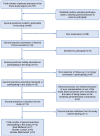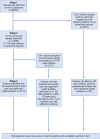Incidence, nature and causes of avoidable significant harm in primary care in England: retrospective case note review
- PMID: 33172907
- PMCID: PMC8606464
- DOI: 10.1136/bmjqs-2020-011405
Incidence, nature and causes of avoidable significant harm in primary care in England: retrospective case note review
Abstract
Objective: To estimate the incidence of avoidable significant harm in primary care in England; describe and classify the associated patient safety incidents and generate suggestions to mitigate risks of ameliorable factors contributing to the incidents.
Design: Retrospective case note review. Patients with significant health problems were identified and clinical judgements were made on avoidability and severity of harm. Factors contributing to avoidable harm were identified and recorded.
Setting: Primary care.
Participants: Thirteen general practitioners (GPs) undertook a retrospective case note review of a sample of 14 407 primary care patients registered with 12 randomly selected general practices from three regions in England (total list size: 92 255 patients).
Main outcome measures: The incidence of significant harm considered at least 'probably avoidable' and the nature of the safety incidents.
Results: The rate of significant harm considered at least probably avoidable was 35.6 (95% CI 23.3 to 48.0) per 100 000 patient-years (57.9, 95% CI 42.2 to 73.7, per 100 000 based on a sensitivity analysis). Overall, 74 cases of avoidable harm were detected, involving 72 patients. Three types of incident accounted for more than 90% of the problems: problems with diagnosis accounted for 45/74 (60.8%) primary incidents, followed by medication-related problems (n=19, 25.7%) and delayed referrals (n=8, 10.8%). In 59 (79.7%) cases, the significant harm could have been identified sooner (n=48) or prevented (n=11) if the GP had taken actions aligned with evidence-based guidelines.
Conclusion: There is likely to be a substantial burden of avoidable significant harm attributable to primary care in England with diagnostic error accounting for most harms. Based on the contributory factors we found, improvements could be made through more effective implementation of existing information technology, enhanced team coordination and communication, and greater personal and informational continuity of care.
Keywords: general practice; patient safety; primary care.
© Author(s) (or their employer(s)) 2021. Re-use permitted under CC BY-NC. No commercial re-use. See rights and permissions. Published by BMJ.
Conflict of interest statement
Competing interests: None declared.
Figures
Comment in
-
Diagnostic errors and harms in primary care: insights to action.BMJ Qual Saf. 2021 Dec;30(12):930-932. doi: 10.1136/bmjqs-2020-012423. Epub 2021 May 31. BMJ Qual Saf. 2021. PMID: 34059559 No abstract available.
References
-
- World Health Organization,, Organisation for Economic Co-Operation and Development,, The World Bank . Delivering quality health services: a global imperative for universal health coverage, 2018. Available: https://apps.who.int/iris/handle/10665/272465 [Accessed 17 Aug 2020].
-
- Sheikh A, Bates DW. Iatrogenic harm in primary care. Harvard Health Policy Review 2014;14:4–8.
-
- NHS Digital . Appointments in general practice, 2018. Available: https://digital.nhs.uk/data-and-information/publications/statistical/app... [Accessed 17 Aug 2020].
-
- Berwick DM, Shojania KG, Atchinson BK. Free from harm: accelerating patient safety improvement fifteen years after to err is human. Boston, MA: National Patient Safety Foundation, 2015.


